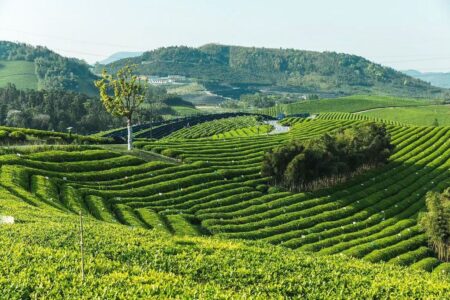Certifications as a Component of Coffee Quality

Image courtesy of Ecotierra
Part two of our four-part series reports on the application of the Café Selva Norte sustainable supply chain project in the Amazonas and Cajamarca provinces of Northern Peru. Part one of the series, printed in the February issue, described the project.
By Rachel Northrop
This is the second installment of our four-part series reporting on the real-time implementation of the Café Selva Norte sustainable supply chain overhaul in the Amazonas and Cajamarca provinces of Northern Peru. Part one of the series outlined the elements of the project: capital investments in measurement of carbon capture, agroforestry technical training, micro loans for land conversion to reverse deforestation, brokerage services, and infrastructural investment in milling and warehouse facilities.
The four producer cooperatives participating in the project, Jumarp, Aprocassi, Cecafé and Cedros Café, all have with Fairtrade and organic certifications. Ecotierra, the Quebec-based project developer implementing the Café Selva Norte project, sees the dual certifications as formalizing the best practices producers are already implementing.
Organic Certification and Coffee Quality
The requirements of organic certification, related to restrictions on the use of pesticide, herbicide and fertilizer inputs, are implemented “to improve agricultural practices aimed at sustainable agriculture and traceability of the product. This process includes an annual audit of the process by the certifier,” explained Guillaume Nadeau, Ecotierra’s communications director.
The audits and the three-year transition required to certify new cooperative members are essentially a formality. Nadeau noted that “at the field level, producers don’t have resources to buy chemical products.” For a region where most production is already compliant with organic standards of input use, the task becomes how to use the certification to ensure that organic production remains viable and producers do not have to turn to slash-and-burn techniques that degrade land.
“The agroforestry model reduces need for inputs on field level,” noted Nadeau. Organic plots are best suited for conversion to agroforestry. “In order to maximize production on existing lands and contain deforestation, producers can almost triple production through highly technical agroforestry versus standard organic production, with no inputs or renovation of trees,” he said. “A lot can be done without extending the use of land.” Café Selva Norte provides a technical packet to complement practices adherent to organic certification’s requirements.
Training is a crucial aspect of successful organic agroforestry, specifically in understanding how organic standard requirements pertain to activities like wet process water management, cover crops, and the use of homemade compost as fertilizers. Proper advice yields coffee that not only bears an organic seal but also achieves high quality physical and sensorial scores. Nadeau cited a 2015 study, Shade Grown Coffee: Double Dividend for Biodiversity and Small-Scale Farmers in Peru by Hivos International, which links shade systems with improved coffee quality, stating “shaded systems are known to produce higher quality coffee beans, increasing the suitability of shaded grown coffee for specialty markets.” (Muschler, 2001; Vaast et al, 2006)
Strategic Investments of Fairtrade Premiums
While organic certification focuses directly on agricultural practices, Fairtrade certifications focus on a cooperative’s business practices and how members manage collective funds. “The audit process is directed at the organization and the cooperatives’ members in order to validate their practices of democracy, transparency and equity,” shared Nadeau.
Fairtrade premiums yield additional returns for producers, but often the dollar amounts of those returns are not enough to make necessary investments in maintaining and improving infrastructure and social services. This is where the Café Selva Norte’s comprehensive project design allow producers to integrate Fairtrade premiums with the project’s components. “The main impact of Café Selva Norte is to increase productivity and sale of certified coffee and multiply investment from certification,” Nadeau told Tea & Coffee Trade Journal. “This has no impact on allocation of premiums – that is still decided by democratic process.”
But because producers know the tasks that the Café Selva Norte project addresses – improved quality and sustainability through agroforestry, carbon capture, client communication – cooperatives can choose to focus Fairtrade premiums on “supporting local or members social needs with health insurance programs or funeral services, emergency needs, cultural activities, sports team equipment, general services or infrastructure such as local roads, access to electricity, school building, garbage management system, and cooperatives’ own laboratory facilities,” said Etienne Desmaris, Ecotierra’s general director, who has seen the evolution of Peru’s cooperatives over the past 15 years.
One of the challenges of working in the certification system, according to Nadeau, is to “generate an active democracy for decision-making, seeking common areas of development, not only for the members of one cooperative, but also for the community where it is located.”
This discussion of collective versus individual action opens a long-running debate in coffee production: is it best to aggregate coffee from many farms to elevate the average quality and sustainability, or to separate crops farmer by farmer to retain microscopic traceability and terroir?
Limits of Certification
Certifications are designed for many farms, for collective actions benefit a group’s member base and the community at large, and their added values tend to break down in the context of individual micro lots. The Cooperu cooperative in Chanchamayo, Junin in Peru’s Selva Central, has experienced both sides of this debate.
The cooperative was founded in 2011 by private exporter NARSA and importer Reach Trade, LLC. The new coop enthusiastically earned both Fairtrade and organic certifications and considered its efforts to be a great achievement. However, it found the rewards to be lacking. “Today, we believe that the certifications have lost their value and purpose for those for whom they were envisioned and created,” said Julio Abel Arevalo Tello, NARSA founding owner and Cooperu member.
Arevalo expressed his frustration. “Certifications only serve as tools of commercial competitiveness to be on equal terms in the domestic market against the unfair and abusive competition of the transnationals that have in their hands the power of negotiation and at their feet the survival of the long-suffering producers.” Arevalo’s outspoken point is that, because such a great percentage of coffee sold by Peruvian cooperatives is Fairtrade and organic certified, dual certification becomes the new baseline expectation to be nationally on par as a Peruvian coffee supplier.
Cooperu has found that they needed something beyond certification to differentiate themselves. Without the ability to add further value, well above the Fairtrade minimum price or per pound premium, selling dually certified coffees would not cover their producers’ basic costs of production and would have led to continued losses.
“There must be conscious equitability if we are to be left with a remote idea of sustainability,” Arevalo asserted. This equitability is found in the form of partners at the importing and roasting level who are willing to pay for coffees based on their specialty attributes of cup quality and personal connection.
Arevalo concluded, “These partnerships allow us to find meaning and hope to do what we love with dignity. Together, we are developing proposals with mutual benefits for sustainability along the coffee value chain.”
Certifications as One of Many Tools
As part of a more comprehensive supply chain overhaul, certifications still have a place in the production of cooperative Peruvian coffee. “Fairtrade and organic certification are great tools for sustainability,” Ecotierra’s Desmaris confirmed. “They allow the coop to pay a better price to the farmer and provide better services. As a component of the Café Selva Norte project, the certifications increase families’ revenues from coffee sales and provide farmers with more and better technical assistance from the coop.”
For smaller organizations like Cooperu, the logistics and human resource costs of complying with the bureaucracy of certifications are too high, and they use their collective action to forge connections with partners who will reward quality outside of a certification scheme.
Dan Hildebrandt roasts coffee from Cooperu for his café and wholesale operation, Uptown Roasters, in New York. He noted that “some roasters require certified organic coffee to maintain product branding but being roasters who are not certified means we have more flexibility.” Hildebrandt is from Peru and has been involved in coffee on the farm level as well. “Somebody – consumer, farmer – has to pay for the cost of the seal. Not certifying eliminates the cost and doesn’t further squeeze farmers who are already squeezed.”
As a component of improved farming practices and cooperative agricultural organizations, Fairtrade and organic certifications can be one step towards translating increases in yield and quality to increases in profitability, therefore fulfilling the goal of environmental and economic sustainability. For this to be the case, it first must be determined that the tool of certification is the best fit for each organization’s production scheme.
Rachel Northrop has been covering coffee for T&CTJ since 2012, while she lived in Latin America’s coffee lands writing When Coffee Speaks. She is based in Brooklyn, NY. She may be reached at [email protected].



